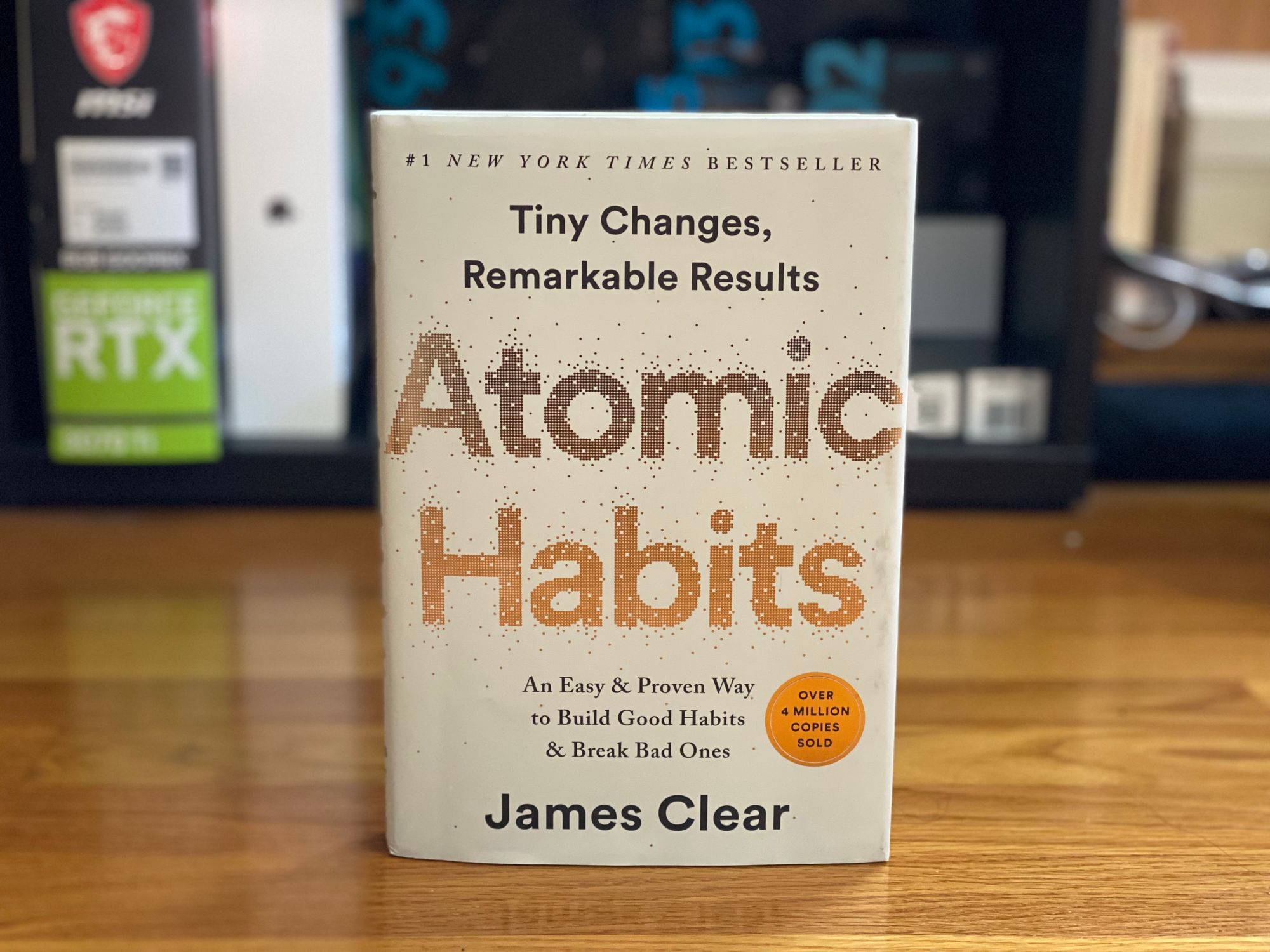Atomic Habits
Notes on James Clear's Atomic Habits. This post is part of a series where I review what I learned from each book I read.

This book isn't even mine, but it completely changed my life. A couple of days into the book, I was finally able to bring myself to lift at the gym every single day, and I still do it. Here's how this book can do the same for you.
Fundamentals
Habits are incredibly powerful, and they determine who you are as a person. Getting 1% better every day will make you 37x better in a year. Sometimes, however, it is hard to get into a good habit or get rid of a bad one. The problem is not that you don't want to change, it's that you don't have the right system. There are 4 different "laws" to help you fix that.
The 1st Law: Make It Obvious
If you want to go to the gym, prepare your gym bag and put it where you will always see it. By making the habit "obvious", you are less likely to forget it. Moreover, it is easier to form new habits in new environments, since you are not fighting against old cues.
On the flip side, made bad habits invisible. If you play too much video games, maybe put the controller under your desk where you can't see it. This way, you will not be reminded about it all the time.
Habit Stacking
This is a technique to make new habits obvious. The formula is "After I [current habit], I will [new habit]". Basically, you will perform your new habit before or after something you already do, like eating breakfast or brushing your teeth.
The 2nd Law: Make It Attractive
The anticipation of a reward drives us to action, and greater anticipation leads to more dopamine in the brain. Make your "hard" habits attractive by bundling things you need to do with things you want to do. For me, I need to do more push-ups, so I do as many push-ups as I can before I allow myself to play The Legend of Zelda: Tears of the Kingdom (I do push-ups way too many times a day).
The inversion of this law is to make bad habits unattractive. One way is to highlight the benefits of avoiding the bad habit.
Use Other People to Shape Your Habits
We humans tend to imitate the habits of three social groups: the close (friends and family), the many (the tribe), and the powerful (those with status and prestige). The easiest way to build better habits is to join groups or cultures where your desired habit is the norm. For example, my closest friends started going to the gym every day. Now, I go to the gym every day.
The 3rd Law: Make it Easy
"Make it easy" - Nathan Levy
Stop planning and trying to be perfect. You learn more from taking action, which brings results and habits. You don't get fit by talking to your personal trainer; you do it by working out.
The amount of time you have been performing a habit is far less important than the number of times you actually do it. It doesn't matter if you exercise once a week for a year; doing five times a week for two months will probably form the habit better.
The Law of Least Effort
Similar to "make it obvious", we are more likely to perform our habits if it is easy and frictionless (we tend to gravitate towards the option that requires the least amount of work). Prime your environment to put your gym bag at the front door, putting your book at the dinner table, putting healthy snacks in the fridge, or anything that would make your good habit easier. On the other hand, make bad habits really hard to do. If you unplug your TV and put it in the garage, you probably will think twice before mindlessly binge-watching Netflix.
Two Minute Rule
Start small, and build up slowly. No new habit should take more than two minutes to perform. I used to be scared of going to the gym because of how many other people were there. On the first three days, I decided to drive over, do 3 sets, and then drive back home; it was incredibly short, but that made me willing to go through with it.
Standardize before you optimize. You can't improve a habit that doesn't exist.
Automation
Automate your habits so that you don't need to think about performing good ones and avoiding bad ones. For example, you could set a screen time limit on your phone if you use too much social media. Or, you could use a meal delivery service to ensure you cook healthy foods. Technology is the best way to automate your habits.
Invest in one-time actions that lock in good habits. I bought a 3D printer so that I would continue creating and developing cool projects. A better example from the book is to enroll in an automatic savings plan.
The 4th Law: Make It Satisfying
Our bad habits often have immediate gratification, but lead to long-term unhappiness. Good habits are the opposite, which is why our brains sometimes want to avoid them. The secret to getting a habit to stick is to feel successful after performing a habit, even if it's just a little bit (maybe use an app to track your progress). The rule is: What is immediately rewarded is repeated. What is immediately punished is avoided.
Habit Tracking
Tracking your habits makes them obvious, attractive, and satisfying. You can use habit stacking to make sure you track your habits: "After I [habit], I will [track my habit]". You don't, however, need to track everything. Some metrics are vanity metrics and do not help you find results. Wait you don't know what vanity metrics are? Read my post on The Lean Startup.
Important: Never miss a good habit twice. Get back on track as soon as possible to keep your streak alive.
Accountability Partner
Create a habit contract with a partner to keep you both accountable. This is just a verbal or written commitment to a particular habit and the punishment that will occur if you don't follow through. The best way to make a bad habit unsatisfying is to immediately painful at the moment.
You can even automate this process. Maybe if you don't wake up at 6:30 AM to run, your phone will automatically post on Instagram that says "I'm too lazy to wake up early and I will pay $5 to the first person who DMs me".
Advanced Tactics
Pick the Right Habit
Genes influence your personality and behavior, so you have a natural advantage/disadvantage in some areas. It is a lot easier to stick with a habit that matches your personality, so pick the ones that work for you.
Learning to play a game where the odds are in your favor is critical for maintaining motivation and feeling successful. If you have a natural talent for a particular area, you will likely find progress fun and easy. But if you pick the wrong habit, it's really hard to succeed.
Here are some questions to find your habit:
- What feels like fun to me, but work to others?
- What makes me lose track of time?
- Where do I get greater returns than the average person?
- What comes naturally to me?
Our genes do not eliminate the need for hard work. They clarify it. They tell us what to work hard on.
Stay Motivated
Use the Goldilocks Rule to stay motivated. The rule states that humans experience peak motivation when working on tasks that are right on the edge of their current abilities. Not too hard. Not too easy. Just right. Hit flow state to become fully immersed in an activity.
Habits will eventually become boring and you will want to quit—even if you are making good progress. The only way to become excellent is to fall in love with boredom; you must be fascinated with doing the same thing over and over. Anyone can work hard when they are motivated, but going when the work isn't exciting is what makes the difference.
The Downside of Good Habits
Once you practice enough, a habit becomes automatic. This dynamic can prevent you from thinking about how to get even better. The moment you feel like you mastered an activity is when you are at risk of complacency. You need deliberate practice on top of automatic habits to achieve the next level of mastery
In order to be conscious of your performance over time, you should reflect and review a couple of times a year. Doing so will prevent the gradual slide of your abilities over time.
Building habits early on can help you build your desired identity, but your new beliefs can also hold you back from the next level of growth. Keep your identity small and do not cling too tightly to a single identity. If your identity is "star Varsity player", what happens after you graduate high school? Keep your identity flexible.
Final Remarks (7/13/23)
I liked this book a lot because of how easy and effective it was to change my habits. Rereading parts of the book for this post reminded me of some key details that helped me continue to code every day even though it was getting a little boring. My improvement will compound as I continue to exercise my habits, and I know I will be a lot better in the future.
